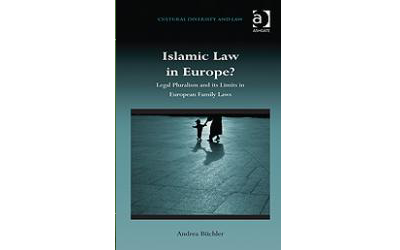Event Details
Islamic Law in Europe?

Author: Andrea Buechler
Publisher: Ashgate
Publication Place: Farnham
Pages: 168
ISBN: 978-1-4094-2849-7
Category: n\a
Description
Cultural and religious identity and family law are inter-related in a number of ways and raise various complex issues. European legal systems have taken various approaches to meeting these challenges. This book examines this complexity and indicates areas in which conflicts may arise by analysing examples from legislation and court decisions in Germany, Switzerland, France, England and Spain. It includes questions of private international law, comments on the various degrees of consideration accorded to cultural identity within substantive family law, and remarks on models of legal pluralism and the dangers that go along with them. It concludes with an evaluation of approaches which are process-based rather than institution-based.
Table of contents
Contents: Preface; Introduction; Cultural and religious diversity in the context of family law; Real and virtual legal spaces: the scope and limitations of conflict-of-laws rules; Accommodation and its scope: the respect for cultural identity in the application and promulgation of substantive family law; Legal pluralism: justification and dangers of a lack of common ground; Beyond cultural and religious identities: introducing discourse ethics and procedure to family-law contexts; Seven theses to sum up and conclude; Conclusion; Bibliography; Index.
Cultural and religious identity and family law are inter-related in a number of ways and raise various complex issues. European legal systems have taken various approaches to meeting these challenges. This book examines this complexity and indicates areas in which conflicts may arise by analysing examples from legislation and court decisions in Germany, Switzerland, France, England and Spain. It includes questions of private international law, comments on the various degrees of consideration accorded to cultural identity within substantive family law, and remarks on models of legal pluralism and the dangers that go along with them. It concludes with an evaluation of approaches which are process-based rather than institution-based.
Table of contents
Contents: Preface; Introduction; Cultural and religious diversity in the context of family law; Real and virtual legal spaces: the scope and limitations of conflict-of-laws rules; Accommodation and its scope: the respect for cultural identity in the application and promulgation of substantive family law; Legal pluralism: justification and dangers of a lack of common ground; Beyond cultural and religious identities: introducing discourse ethics and procedure to family-law contexts; Seven theses to sum up and conclude; Conclusion; Bibliography; Index.









